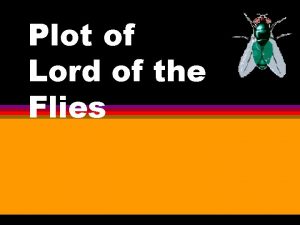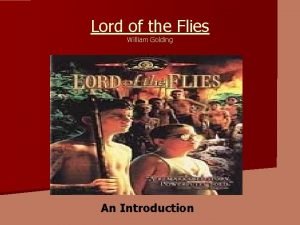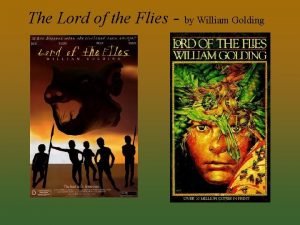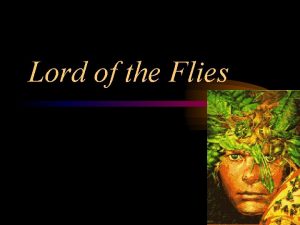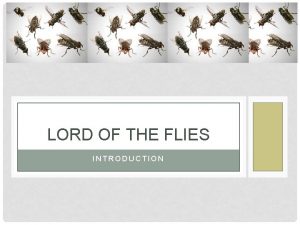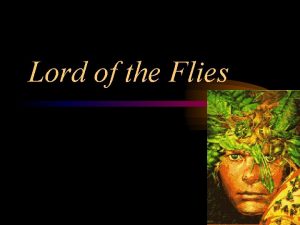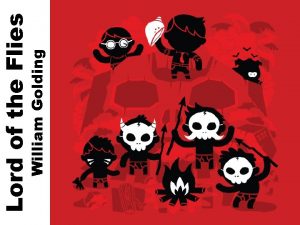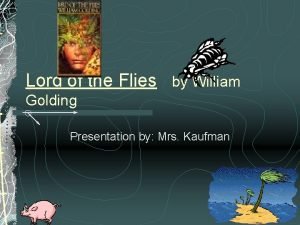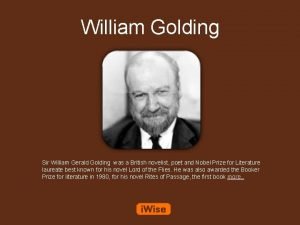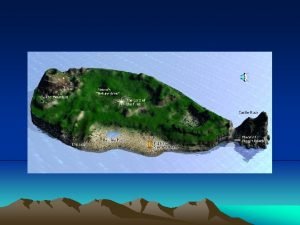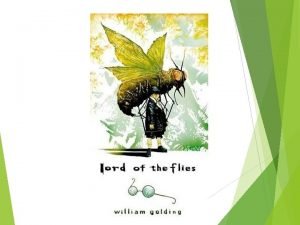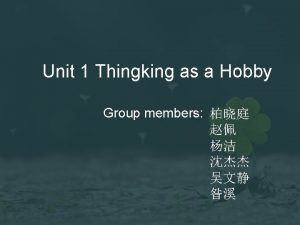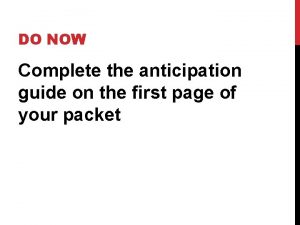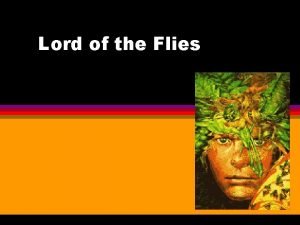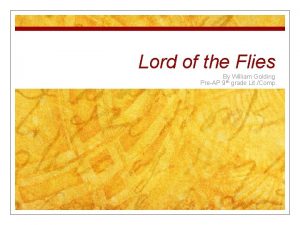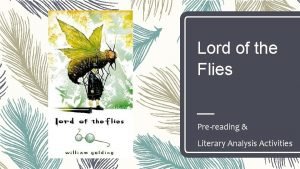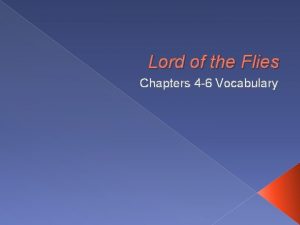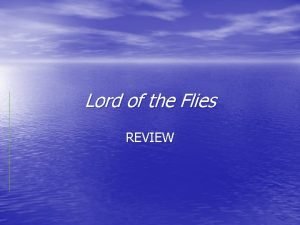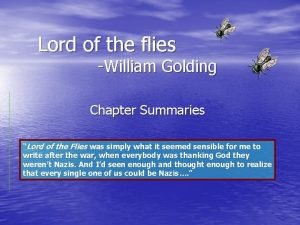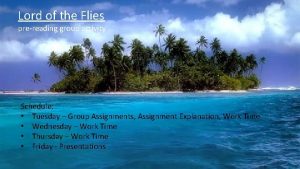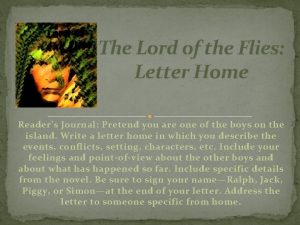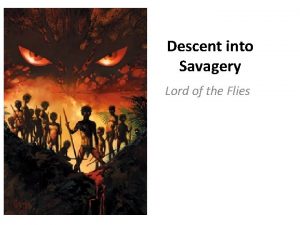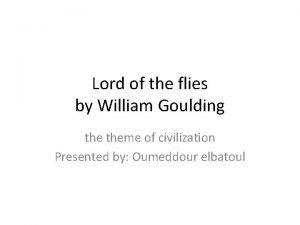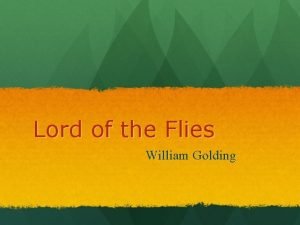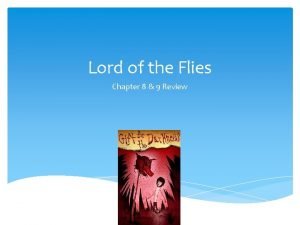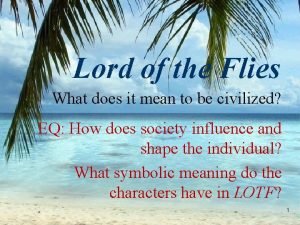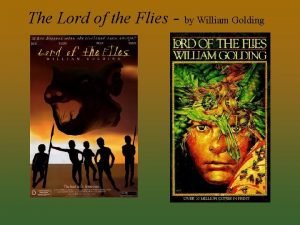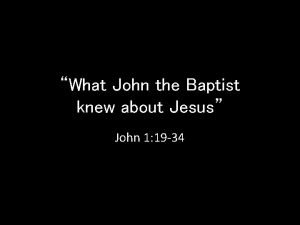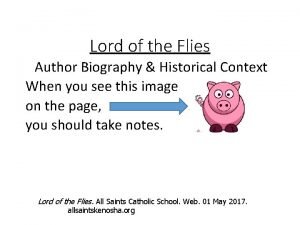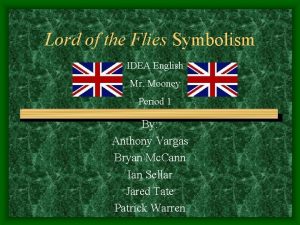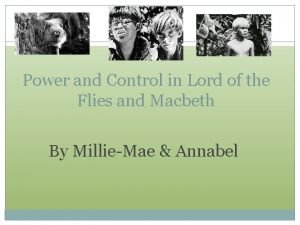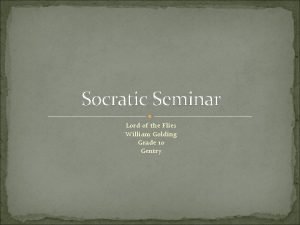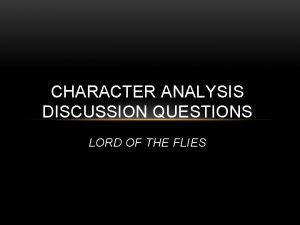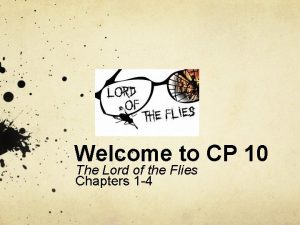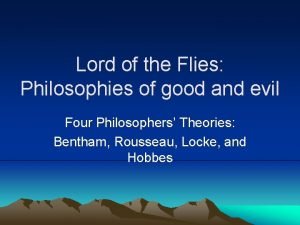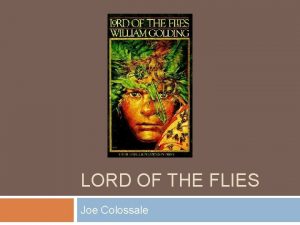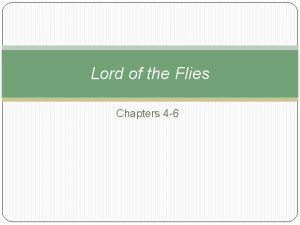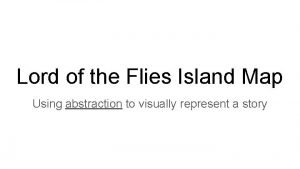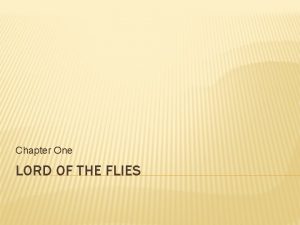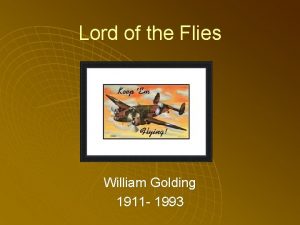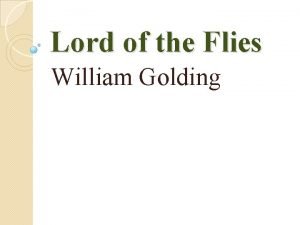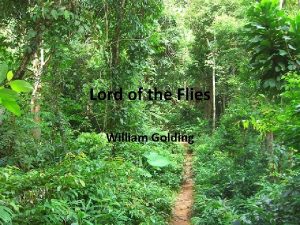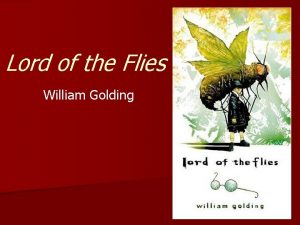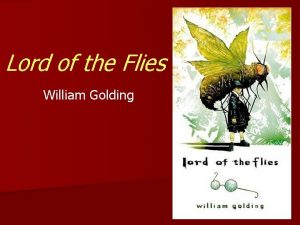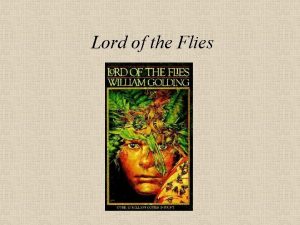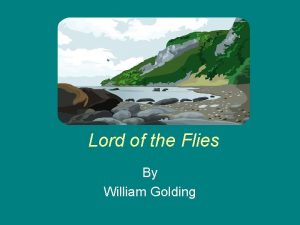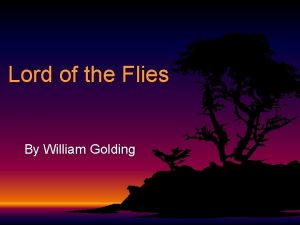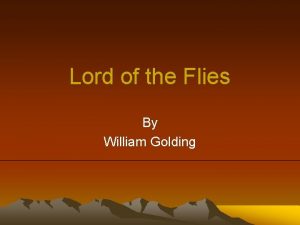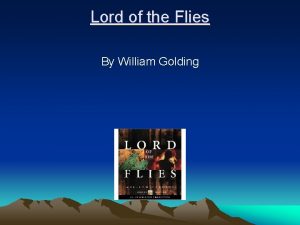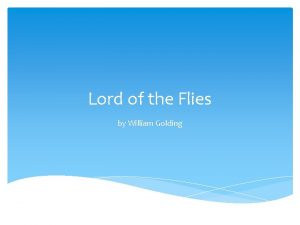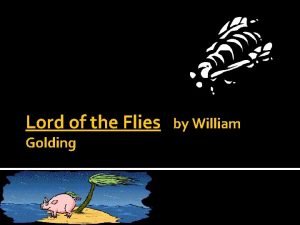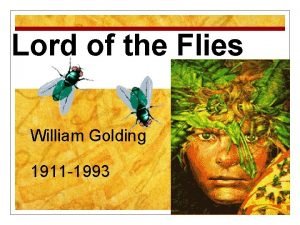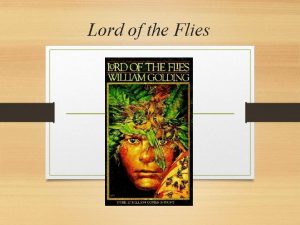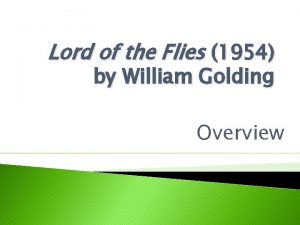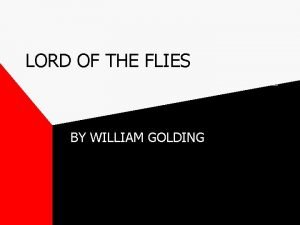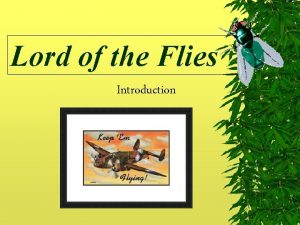Lord of the Flies William Golding William Golding













































- Slides: 45

Lord of the Flies William Golding

William Golding (1911 -1993): William Golding was born in 1911 in Cornwall, England. He spent two years studying science at Oxford before abruptly changing his degree to poetry and literature. He became an English school teacher before joining the British Royal Navy in 1940 to fight in WWII. In 1954 he published his first novel, Lord of the Flies. In 1983, he was awarded the Nobel Prize for Literature. Golding was profoundly affected by his experience in WWII. Of his experiences Golding says this: “I began to see what people were capable of doing. Anyone who moved through those years without understanding that man produces evil as a bee produces honey, must have been blind or wrong in the head. ” He also said this: “one had one's nose rubbed in human condition. ” The “human condition” is a phrase that basically means “what it's like to be a human being. ”

Synopsis Lord of the Flies is a novel about a group of English schoolboys who became stranded on an island during a nuclear war. Some of the slang the boys use may initially confuse you because it's the 1950 s and it's England. As time passes, the boys begin to change and build a society. Lord of the Flies is an allegory, that is, a story in which the characters and events are symbols that stand for ideas about human life or for a political, spiritual, or historical situation.

Think about it 1. Beelzebub is a Hebrew word for Lucifer, or the Devil. Literally translated in English, however, Beelzebub means “Lord of the Flies. ” 2. The boys are stranded during a nuclear war— as you read the beginning of chapter one closely and try to find context clues that support this statement. 3. As you read the book, consider the following questions: a. Who or what is the Lord of the Flies? b. What is Golding telling us about the “human condition”—what it means to be a human— through the story of these boys and the society they build?

Terms to know Allegory: (n. ) 1. A story in which the characters and events are symbols that stand for ideas about human life or for a political, spiritual, or historical situation. 2. a narrative in which the characters and situations are created to portray an interpretation beyond a literal and concrete meaning Often teaches a lesson through the use of symbolism Edenic: (adj. - derivative of Eden) 1. The place where Adam and Eve lived before the Fall. Gen. 2: 8– 24. 2. any delightful region or abode; paradise. 3. a state of perfect happiness or bliss. Dystopia: (n. ) 1. Opposite of a utopia. 2. a society characterized by human misery.

More terms Christ-figure: (n. ) A literary technique that the author uses to draw allusions between their characters and the biblical Jesus Christ. For instance, the character might display one or more of the following traits: performance of miracles, manifestation of divine qualities, healing others, display loving kindness and forgiveness, fight for justice, being guided by the spirit of the character's father, death and resurrection. In postmodern literature, the resurrection theme is often abandoned, leaving us with the image of a martyr sacrificing himself for a greater good. It is common to see Christ-figures displayed in a manner suggestive of crucifixion as well. Sadism: (n. ) The tendency to derive pleasure from inflicting pain, suffering, or humiliation on others; in general, cruelty.

Themes Law and Order Reason and Logic compare to Fear and Emotion Chaos and Evil Hope and Rescue Isolation and the lack of Adult Supervision

Survival Scenario: You are traveling by plane on an extravagant field trip. Your plane crashes into a deserted island in the Pacific Ocean. You survive, but quickly realize your challenge of survival has just begun. Your island has enough rainfall to create a small stream of water for drinking and limited wildlife for hunting, but nothing else – not even phone service. Additionally you were only able to grab three items from the bags before being thrown from the plane. Using the information above, come up with a plan for the following: • Food • Shelter • Rescue

Did someone in your group emerge as a leader? Who? How did you know this person was taking a leadership role? Explain? How did your group avoid conflict of ideas? For example, if one person had a good idea for how to get rescued, but the others didn’t agree with it, what happened? If this were real life, would you go along with the group’s final plan, or would you go it alone and make a plan by yourself? Why? Which type of “animal instincts” emerged from your group members as you made a plan? Based on this answer, who would be most likely to survive? Explain.



What happens when the safeguards and government of modern society is no longer present?


Are we born evil? Or do we become evil through experience? Why do we behave in the manner that we do? Out of fear of punishment or free will?




Chapter One – The Sound of the Shell At this point, the children are childlike and the island is a kind of utopia; discuss the advantages to no adults and to being able to start a society on an island on your own. What makes the island a utopia? The boys have just landed on the island; what is the next step? What is necessary for a society to be established? What rules and laws are established in our societies that govern our lives? Why are they there? What qualifies a leader? What characteristics do leaders have that are necessary for leadership? What kinds of characteristics does a good leader have? Are leaders born leaders or do leaders have to learn how to be a leader? That is, is leadership innate (an inherent characteristic) or is leadership a learned behavior?

If you were stranded on an island, how would you survive? What would be necessary to survive and how would you go about creating/finding that? If you were stranded on an island, what rules would you set in place? Who are some good leaders in our community? In our class, who would you choose as a leader and why? Why is Piggy so obsessed about finding the others and calling a meeting? What does this say about his character and personality? Golding makes references to what is happening in the rest of the world. What is happening? Why do the conch and the election signify the beginnings of government? How successful is it likely to be and why?

Imperialism “We’ve got to have rules and obey them. After all, we’re not savages. We’re English, and the English are best at everything. So we’ve got to do the right things. ” – Jack (p 42)

What is imperialism? http: //en. wikipedia. org/wiki/Imperialism Sociologist Lewis Samuel Feuer identifies "progressive imperialism" as a view of humanity that promotes the spread of civilization to allegedly "backward" societies to elevate living standards and culture in conquered territories and allowance of a conquered people to assimilate into the imperial society, examples being the Roman Empire and British Empire.

Another view of imperialism

Justification for imperialism http: //en. wikipedia. org/wiki/Imperialism A controversial aspect of imperialism is the imperial power’s defense and justification of such actions. J. A. Hobson, a critic of imperialism, identifies this justification: “It is desirable that the earth should be peopled, governed, and developed, as far as possible, by the races which can do this work best, i. e. by the races of highest 'social efficiency'. ”

Another view of imperialism’s racial justification

from “The White Man’s Burden” by Rudyard Kipling Take up the White Man's burden-Send forth the best ye breed-Go bind your sons to exile To serve your captives' need; To wait in heavy harness, On fluttered folk and wild-Your new-caught, sullen peoples, Half-devil and half-child.

Another view

Ethnocentrism (Eurocentrism) Ethnocentrism is judging another culture solely by the values and standards of one's own culture.

Another view

The Coral Island by R. M. Ballantyne The Coral Island strongly advocates the strength of Victorian Britain, and its ability to create control, order and reason. Victorian British society felt that this “blessed” and ordered country had an obligation to promote order and reason and create ‘civilized society’ around the world, by preaching Victorian morality, values, and beliefs. Thus, three boys stranded alone on an island manage to achieve a utopian society through conformity to these strict Victorian ideals. From the moment they find themselves stranded on the island, they quickly create a controlled environment, electing Jack, the wisest and most knowledgeable, as leader. This utopia on Jack’s Coral Island is heavily contrasted to the “lawlessness” of the natives and their islands. It shows that the savages would be better off under British rule, thus advocating the Victorian eras firm belief in Imperialism in order to achieve control and order.

Chapter Two – Fire on the Mountain Where in society do we see bullying occur? What extreme situations of bullying have you witnessed/been a part of? How do we handle them? What are the ramifications of bullying? Physical, mental, emotional, psychological, etc. ? From what you know about the characters now, who would you rather have as a friend – Piggy, Ralph, or Jack? Who would you rather have as a leader? Why? “The simple statement, unbacked by any proof but the weight of Ralph’s new authority, brought light and happiness. ” (29) What is the “weight” of an encouraging word? Would you rather have someone lie to you and make you feel better or tell you the truth if it means feeling worried, pressured, and burdened?

What conflicts arise between characters? How would you have handled the conflicts personally? If you saw the bullying that Piggy underwent, would you stand up for him? The government is already showing signs of weakness. What are the signs? Why does no one respect Piggy or his suggestions? Who will be blamed for the small child’s accidental death? Why?

Chapter Three – Huts on the Beach When you have a problem with someone you are supposed to work with (same class project, same job, same church, etc. ), how do you handle it? “If you’re hunting sometimes you catch yourself feeling as if --” He flushed suddenly. “There’s nothing in it of course. Just a feeling. But you feel as if you’re not hunting, but – being hunted, as if something’s behind you all the time in the jungle. ” (43) What does he mean? What does the tension between Ralph and Jack suggest? Do you think their collaboration will get better or worse as time goes on? What fears might you have if you were alone on an island? “He wanted to explain how people were never quite what you thought they were. ” (45) What is Piggy inferring about people in general? What is the author trying to convey by mentioning ‘not a good island’? Why is Jack obsessed with killing a pig for meat? What do you think Simon was trying to do towards the end of the chapter? Describe the conflict between Ralph and Jack.

Chapter Four – Painted Faces and Long Hair What distinguishes children from adults today? Is there an inner struggle between good and evil within us? If so, how do we see this struggle in real life? What evidence have we begun to see of savagery in the book? What “masks” do we put on that liberate us? What do these masks allow us to do that we otherwise wouldn’t do on our own? Look at technology – is it now easier to talk on the phone or on Facebook than it is in person? Are we less inhibited on Facebook? “There had grown…the opinion that Piggy was an outsider, not only by accent…but by fat, and ass-mar, and specs, and a certain disinclination for manual labor” (65). How do we identify “outsiders” today – in school, in society? Are the identifications based on physical or personality

What is your opinion of Jack so far? If you were Ralph, what would you have done differently? Would you have stuck up for Piggy or would you have handled Jack differently? What does ‘taboo of the old life’ (62) mean? What is Jack’s mask a metaphor for? What message is Golding trying to convey? Do the boys really need Jack to get meat? Why or Why not? Why don’t the boys realize the importance of the fire? What is happening to the boys?

Chapter Five – Beast from Water As Ralph continues his leadership, he begins to feel extremely weary. Why do you think this happens? Keeping in mind that Ralph is a small boy, how do you think leadership will affect him? Fear is talked a lot about in connection with the beast. They have never seen the beast, but it is talked about as if it’s real. Do you think something is in the jungle? Is the “beast” real or is it a figment of their imagination? “I mean when Jack says you can be frightened because people are frightened anyway that’s all right. But when he says there’s only pigs on this island I expect he’s right but he doesn’t know, not really, not certainly I mean…I don’t believe in the beast of course. As Piggy says, life’s scientific, but we don’t know, do we? Not certainly, I mean. ” – Maurice What “beasts” do we fear in our own lives? Do we fear certainties or uncertainties more? Their world is noticeably moving from order to chaos; how have we seen this so far? If you were on the island, would you rather be in a leadership position or a follower position? Why?

“Fear can’t hurt you any more than a dream” (82). – Jack Do you agree or disagree? Why? What are each boys thoughts on the beast? (Ralph, Jack, Piggy, Maurice) What were the reminders and ground rules laid down by Ralph? Why are things – the system – breaking down? Why do you think the government broke down? What have Ralph, Piggy and Simon grown to understand about adult authority?

Chapter Six – Beast from Air Jack is constantly challenging the rules and order and structure of their society. What is the consequence for people who challenge laws of society today? What kind of leader would Jack be if he was an adult leading in our country today? What would his leadership look like? What would you like about it and what would you hate? After Jack has had his say against Ralph and order and such, how does Ralph’s authority remain intact? Why does Jack even listen to him? Is having a co-leader necessary? Why does a vice president, an assistant manager, a co-captain, etc. exist? Can a leader truly stand on his or her own, or does he or she need assistance? What makes public speaking so terrifying? Is it easier to lead or to follow? What are the pros and cons of each? Keep notice of Ralph and Simon. “Ralph dismissed Simon and returned to his personal hell. ” (104) What is this personal hell? Why is it a “personal hell”? What is the Beast from the Air? What is the significance of this adult sign?

Chapter Seven – Shadows and Tall Trees How does play often get out of hand become reality? How has the setting changed since the beginning of the book? How has it transformed into more of a hell than a utopia? What role does our conscious play? What is the benefit of being able to walk in another’s shoes? Choose two characters. How have the characters changed since the beginning of the book? What do you think the ‘olive grey, jelly like fruit’ is? (109)

Chapter Eight – Gift for the Darkness What are the effects of an oppressive leader on society? Do you ever feel sorry for Jack? What might compel us to feel sorry about Jack? Who is right – Jack or Ralph? Who would you follow? How has the issue of death and killing morphed for Jack and his followers? What savage elements do we see? What temptations are found in the text?

Why don’t the boys want Jack as chief? Why do they still want Ralph? Golding doesn’t describe in detail what has happened to Jack and his choir – making reference only to them being savages. Describe what has happened to them. Ralph has become openly frightened – about what? Who or what is the ‘Lord of the Flies’? Two meanings were given for the name – what are they and why are they significant? What is the relationship between Simon and the Lord? Why is this chapter the central chapter of the novel? Metaphorically, are the beast and Jack one in the same? Explain. What has happened and changed about the

Chapter Nine – A View to a Death How has Jack become an idol? Is he a “god” figure? A “satan” figure? What do we idolize and who do we follow? How did the “fun” and “games” get out of hand in Jack’s clan? Simon is tragically and accidentally killed. Why was he mistaken for the beast? What is the parachuter on the mountain a symbol or metaphor for? We see Simon now as the truly great and intelligent boy – why? Why do Ralph and Piggy seek solace in this new society Jack has created? How and why is it governable?

Chapter Ten – The Shell and the Glasses Do murders win or lose? Do the bad guys who commit a successful crime win? Or lose? How does murder affect the victim (Simon), the bad guys (Jack and his followers), and the good guys (Ralph/Piggy)? How does good reestablish itself (how does normality return) after evil has its way? How and why do we try to lessen the seriousness of events when something bad happens? What effect does Golding’s decision to eliminate names have? What is the purpose of this namelessness? (We also see this in Harry Potter with “he who must not be named. ”) If Jack were to apologize, what do you think the outcome would be? Why do none of the children fully recognize what has happened, what they’ve done, and its significance? ‘[Roger] sat still, assimilating the possibilities of irresponsible authority. ’ What is Golding helping us to realize about Roger here?

Chapter Eleven – Castle Rock Piggy gives a very daring speech; he is standing for what’s right and calling for respect and justice. If you were Piggy would you do the same? What would life be like without figures who did what Piggy did? (Martin Luther King, Harriet Beecher Stowe, Rosa Parks, etc. ) They were all standing against a group of people who hated them, and they knew they were the minority. What logic/conviction do these people have? What fears and internal struggles do they face? Do imperfections in leaders make them any less leaders? In our eyes? In the eyes of society? How do their flaws affect their ability to lead and our ability to follow? What is the significance of Golding’s use of “myopia”? What is the significance of the face paint? What does it allow the boys to do? Could they be savages without it? Why or Why not? Piggy’s death is the third death. Does the author want us to believe that is was like the others? Explain.

Chapter Twelve – Cry of the Hunters How does Golding shift the perspective of the readers of the characters from beginning to end? How does the island change the boys? What is it about the characters and Golding’s writing that makes us forget their childhood? Do they REALLY change into forceful savages or are they always, through the duration of the book, little boys living in fear? Why does he use children in this book – why not adults? Why just boys?

What do the boys realize when they see the naval officer? What finally caused them to be rescued? What is the irony of this? ‘Fun and games, having a war, ’ what is the irony behind the comments of the officer? Why does Ralph say that only two were killed? Who do you think he was referring to? Do you think the boys will reveal what has happened? Why or Why not? Why do the boys break down into uncontrollable sobs causing the officer to look away in embarrassment?
 Plot of lord of the flies
Plot of lord of the flies William golding introduction
William golding introduction Samneric
Samneric William golding substance abuse
William golding substance abuse William golding nazi
William golding nazi William golding born
William golding born William golding nazi
William golding nazi William golding nazi
William golding nazi Lord of the flies presentation
Lord of the flies presentation William gerald golding
William gerald golding Lord of the flies island
Lord of the flies island William golding nazi
William golding nazi Thinking as a hobby
Thinking as a hobby Ambiguities definition
Ambiguities definition Hunger games anticipation guide
Hunger games anticipation guide How do others perceive ralph in lord of the flies
How do others perceive ralph in lord of the flies Exposition of lord of the flies
Exposition of lord of the flies Ego defense mechanisms in lord of the flies
Ego defense mechanisms in lord of the flies Lord of the flies vocabulary chapter 4-6
Lord of the flies vocabulary chapter 4-6 Lord of the flies christian review
Lord of the flies christian review Exposition lord of the flies
Exposition lord of the flies Corpulent definition lord of the flies
Corpulent definition lord of the flies Chapter summaries of lord of the flies
Chapter summaries of lord of the flies Lord of the flies group activities
Lord of the flies group activities Lord of the flies letter home
Lord of the flies letter home Descent into savagery lord of the flies
Descent into savagery lord of the flies Lord of the flies civilization quotes
Lord of the flies civilization quotes Ch 7 summary lord of the flies
Ch 7 summary lord of the flies Lotf chapter 9 summary
Lotf chapter 9 summary Piggy lord of the flies
Piggy lord of the flies A________ is a symbol of power
A________ is a symbol of power Skinny vivid little boy
Skinny vivid little boy Lord of the flies book cover
Lord of the flies book cover Context of lord of the flies
Context of lord of the flies Mock hunt lord of the flies
Mock hunt lord of the flies Power in lord of the flies
Power in lord of the flies Lord of the flies socratic seminar
Lord of the flies socratic seminar Discussion questions for lord of the flies
Discussion questions for lord of the flies Figurative language lord of the flies chapter 1
Figurative language lord of the flies chapter 1 Rousseau lord of the flies
Rousseau lord of the flies Lord of the flies background
Lord of the flies background Lord of the flies plane
Lord of the flies plane Timeline of events chapters 4-6 lord of the flies
Timeline of events chapters 4-6 lord of the flies Island map lord of the flies
Island map lord of the flies Chapter 1 summary lord of the flies
Chapter 1 summary lord of the flies Simpsons lord of the flies
Simpsons lord of the flies
